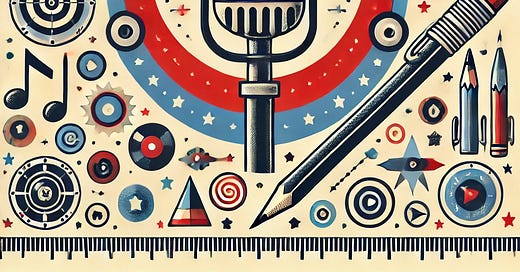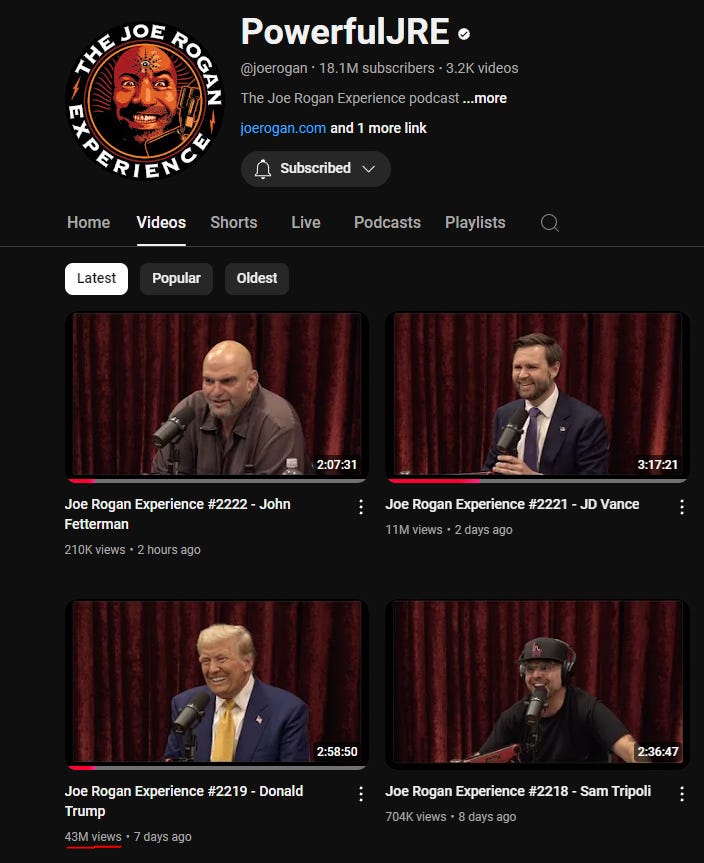This election cycle, I've found myself dodging political discourse—a stark contrast to my past passion for these discussions.
I've been thinking about why that's the case. In fact, I love any conversation about how to make our future better. An attempt to arrive at the truth is what I'm doing here.
But a cultural shift seemed to cause a change within me. I still felt the urge to speak up and say my piece, but I noticed inaction on my end.
Not inaction from fear but from a disciplined resistance.
Hamish McKenzie's piece, 'Garbage,' helped me realize why I've felt this way during this election cycle.
I previously warned that an authenticity crisis was surfacing in the culture. Social algorithms prioritize engagement, a euphemism for addiction. Consequently, many creators design content that doesn't satisfy but instead fuels outrage and intoxicates the audience.
The point is that creators invite the algorithm into their speech; therefore, they are no longer themselves.
They're something else; the algorithm is a part of them. Their thought patterns and speech change in service to the algorithm so that they can effectively gain reach. The algorithm is optimized to make you more applicable to people to the extent your content is addicting. This can be navigated to retain authenticity and still gain reach, but a very small minority seem to hit it.
This constant adaptation to algorithmic incentives dilutes the authenticity of communication, eroding meaningful discourse both online and in person.
What once was a tool to drive engagement online has now influenced real-world discussions in unsettling ways.
McKenzie puts it directly:
"The trash twist to this week's news is fitting for the garbage fire that is our current political discourse, which has adopted the language of social media. We might not know how to talk to each other, but we do know how to dunk on each other. We are polarized and dug in. We are billowing with outrage and alarm. We are certain that the other side is evil and dangerous.
Trump is a fascist.
Kamala's a communist.
Trump is Hitler.
Kamala's the antichrist.
Illegals are overrunning the country.
Democracy dies in darkness.
Insane!
Epic.
Fraud!
Lol.
It's all so very dumb."
Another major issue is the 'mainstream media's' unapologetically biased and seemingly coordinated messaging. I think it's a related issue because I would argue that the underlying philosophical impetus to the seemingly coordinated ideological transmission latched onto people's minds like a virus through social media, an ideology that would have died if it was localized to a physical community. Elon articulates this nicely on a previous podcast with Joe.
The Washington Post acknowledged America's distrust in media in a piece by Jeff Bezos titled 'The Hard Truth: Americans Don't Trust the News Media.'
YES! Thank you!
He referred to the Gallup poll showing American's trust in media remains at a trend low.
These two issues are disheartening and pose a direct threat to what I value most: the pursuit of truth.
This would be an existential crisis for humanity if it weren't for an alternative—an alternative that has the power to turn these issues upside down.
Long-form podcasts and independent creators.
These are spaces where the conversation doesn't end at a convenient soundbite but rather flows naturally over hours and pages, where ideas can evolve, arguments can breathe, and listeners and readers can truly understand—not just react.
This shift represents a powerful counterbalance to traditional media—one that champions depth, nuance, and authenticity over sensationalism.
Podcasters and writers who retain their authenticity and refuse to corrupt themselves in favor of the truth will win for themselves and society.
Evident by Joe Rogan's interview with Trump, which had 43 million views in 7 days!
As of November 2, 2024, Joe has hosted Trump, Vance, and Fetterman, and extended an invitation to Kamala Harris, who I hope makes an appearance on the show.
I don't have hard data to prove that podcasts and newsletters will significantly impact the election. But I believe, in hindsight, this election will be seen as the turning point.
How could it not?
Truth emerges from the battlefield of ideas, where each must be given room to clash and contend. True discourse requires the expanse of uncensored hours and pages, not mere moments of restricted dialogue.
I've seen the power of podcasts for over 10 years now. They've highlighted great ideas and terrible ideas in many realms of thought. It's about time politicians started making rounds.
What's amazing about this to me is that long-form podcasting allows you to hear the interviewee having a 2–3-hour conversation. All the political doublespeak, canned responses, and lies come out in a discussion that long. It would be so unnatural for someone to speak as they do in a political press conference when they're just having a face-to-face conversation.
I want to see the candidates as people, and I want to see that they're not trying to pull one over me. I want to see that they're intelligent, that they know what they're talking about, and that they can have a conversation about their subject matter for three hours.
If you want to run the country, you should be able to talk about solutions to its problems for more than 2 hours.
I want to see the passion. Hear the passion. Feel the passion that the person has about what they're trying to accomplish.
That rarely comes across in a two-minute response window on an extraordinarily complicated issue.
"Solve the problem of our border crisis and the potential for World War 3; you have two minutes; HOW ARE YOU GOING TO DO IT? GO!!"
It's crazy.
But I think this election cycle, we are seeing the beginning of the end of the old way and the start of the new way.
Imagine if we could see a live-streamed, uninterrupted, 3-hour conversation between both candidates. We would see how they interacted and debated ideas with the opposing party.
Such a debate would provide the transparency that today's scripted appearances can't offer, letting voters see beyond rehearsed talking points.
Imagine getting to see the candidates talk for hours on end, elaborate on complex ideas, and receive feedback and input from the interviewer all through the election cycle. Now supplement that with nuanced positions and takes from independent creators who don't have a coordinated and clear bias and aren't trying to just hit a click.
That is American.
The possibility for everyone to say their piece and publish it if they want. And for people to seek out opinions across the board and to seek out long-form interviews with the candidate.
I saw this with Robert Kennedy Jr. throughout the race. He interviewed many different people who I enjoyed listening to, all of who asked him questions from different angles. He did Lex Fridman's podcast, Joe Rogan's, Jordan Peterson's, and Theo Vonn's. I was able to see him and his ideas in a different light and more expansively.
I hope this is the final election cycle marked by baiting, algorithm-driven discourse, headline manipulation, and political gaslighting.
Creators who stay authentic in their pursuit of truth will help bring out a person's true nature for everyone else to view and decide rather than being fed what to think with biased headlines and force-fed takes.
In the end, it's about the pursuit of truth, and I think we may have lost our way. This disillusionment led me to avoid political conversations altogether. Yet, independent creators renewed my hope for the future of media and the discovery of truth.
I hope this is the election cycle in which, in the end, truth prevails. That all the media institutions frankly admit to their faults and change course or fall over and die a quick death to make room for those who actually care about the truth more than they care about a quick dollar.
Take back your political discourse from the algorithm by seeking out long-form conversations and sharing content that makes you think differently, not just react. The truth isn't served in snippets and gotchas—it's revealed through genuine dialogue, so let's demand that from our media, our candidates, and ourselves.
And, of course, by subscribing to those who you believe try their best to do so :)
Until next time
Take care of yourselves, everyone.
Dom






